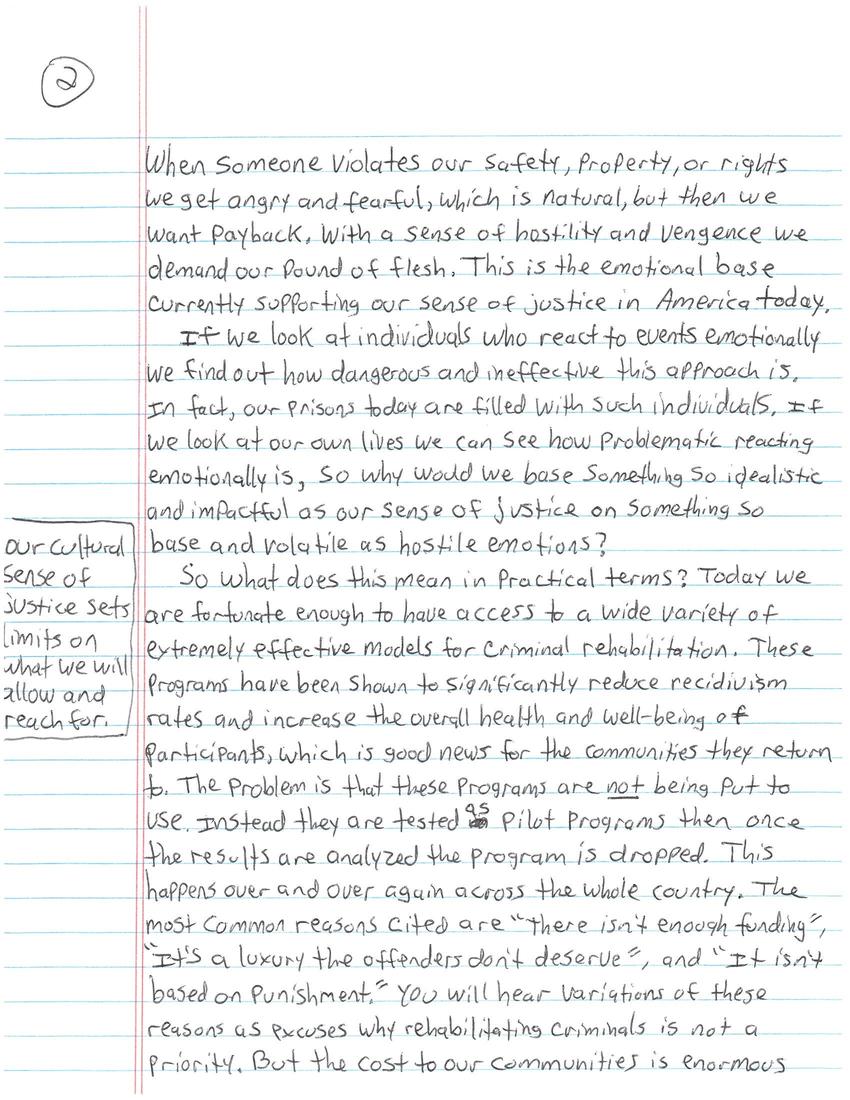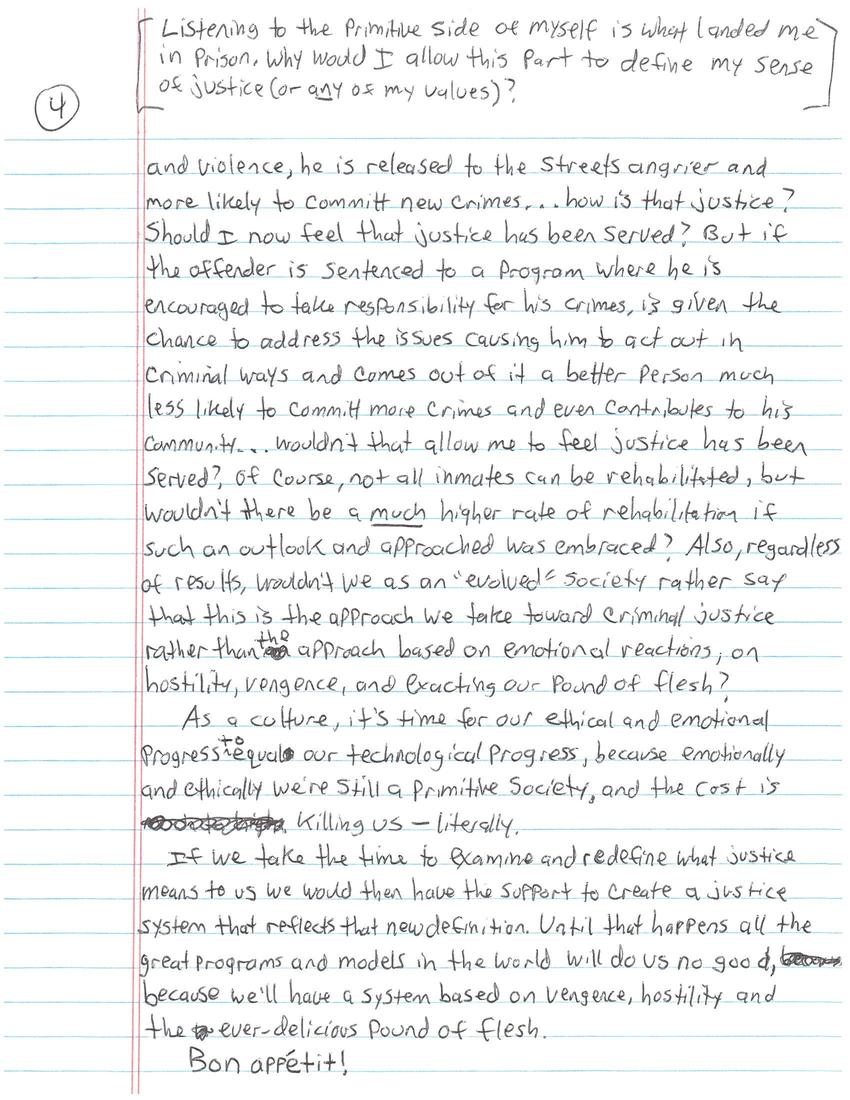
Transcription
Justice:
A dish served hot in America
BY Daniel Labbe
With the world's largest prison population,
cities brimming with gang violence, drug addiction, and
homelessness, and ever-increasing acts of catastrophic
violence it is obvious that the United States, land of
opportunity, freedom, and the American Dream, is in
desperate need of some soul-searching.
There is no way we can continue to keep our Patriotic
heads buried in the sand chanting, "Everything's all right.
Everything is fine." Just take a look at tonight's
new broadcast. You will see that everything is certainly
not fine.
So what's wrong? Well, for many Americans Personal
safety and the safety of their families and friends is
becoming a growing and even urgent, concern. In the past
America has addressed this issue by creating stiffer
sentencing laws, beefing up police forces, and building more
prisons while stripping those prisons of rehabilatative
programs (they were viewed as luxeries that inmates did not
deserve). This has been our response to violence and crime
for over 25 years now. How bad do things have to get
for us to realize that this stradegy isn't working?
So if our current policies aren't working why do we
persist in using them? One reason is that we are still
reacting to the issue emotionally rather than rationally.
The elephant in the room is now crushing us. Will we still
ignore it?
Policies based on emotional hetoric are dangerous and manifulative.
When someone violates our safety, property, or rights
we get angry and fearful, which is natural, but then we
want payback. With a sense of hastility and vengence we
demand our pound of flesh. This is the emotional base
currently supporting our sense of justice in America today.
If we look at individuals who react to events emotionally
we find out how dangerous and ineffective this approach is.
In fact, our prisons today are filled with such individuals. If
we look at our own lives we can see how problematic reacting
emotionally is, so why would we base something so idealistic
and impactful as our sense of justice on something so
base and volatile as hostile emotions?
So what does this mean in Practical terms? Today we
are fortunate enough to have access to a wide variety of
extremely effective models for criminal rehabilitaion. These
programs have been shown to significantly reduce recidiuism
rates and increase the overall health and well-being of
participants, which is good news for the communities they return
to. The problem is that these programs are not being put to
use. Instead they are tested as pilot programs then once
the results are analyzed the program is dropped. This
happens over and over again across the whole country. The
most common reasons cited are "there isn't enough fundin",
"It's a luxury the offenders don't deserve", and "It isn't
based on punishment." You will hear variations of these
reasons as excuses why rehabilitating criminals is not a
priority. But the cost to our communities is enormous
and unacceptable in a society that claims to lead the
world in human rights, democracy, and freedom.
Our cultural sense of justice sets limits on what we will
allow and reach for.
Because the programs and models for effective criminal
rehabilitation are available, the next step for creating a
safer, more humane and evolved America will have to come
from its citizens (of course, the offenders have to take
responsibility as well. For more on this see my article entitled
Prison Reform; True change begins with us). As a culture
we need to examine our definition of justice and own
up to the emotional, and even barbaric components
comprising it. Once seen for its primitive and damaging
effects we can redefine what justice means to us. We
can create a sense of justice that is nobler, based on
reason, and results in a justice system that reflects
our highest valves. Until that happens politicians and
law-makers will not be able to (or motivated to) make use
of the amazing models and methods for rehabilitation
available to us today. There just won't be the necessary
support to create the systemic changes that are needed.
So what would a healthier, nobler, definition of
justice look like? I would like to introduce the idea
that the only true justice is a truly rehabilitated
offender. Think about it. When someone committs a
crime against me the primitive part of me wants revenge,
wants to see the offender suffer. But how does this equal
true justice? If after the offender does time in a
harsh, punishing environment, a place full of hate, hostility
listening to the primitive side of myself is what landed me
in prison. Why would I allow this part to define my sense
of justice (or any of my values)?
and violence, he is released to the streets angrier and
more likely to committ new crimes...how is that justice?
Should I now feel that justice has been served? But if
the offender is sentenced to a program where he is
encouraged to take responsibility for his crimes, is given the
chance to address the issues causing him to act out in
criminal ways and comes out of it a better person much
less likely to committ more crimes and even contributes to his
community...wouldn't that allow me to feel justice has been
served? Of course, not all inmates can be rehabilitated, but
wouldn't there be a much higher rate of rehabilitaion if
such an outlook and approached was embraced? Alson, regardless
of results, wouldn't we as an "evolved" society rather say
that this is the approach we take toward criminal justice
rather than the approach based on emotional reactions, on
hostility, vengence, and exacting our pound of flesh?
As a culture, it's time for our ethical and emotional
progress to equal our technological progress, because emotionally
and ethically we're still a primitive society, and the cost is
killing us-literally.
If we take the time to examine and redefine what justice
means to us we would then have the support to create a justice
system that reflects that new definition. Until that happens all the
great programs and models in the world will do us no good
because we'll have a system based on vengence, hostility and
the ever-delicious pound of flesh.
Bon appetit!
Other posts by this author
|
2016 aug 4

|
2016 jun 25

|
2016 jun 9

|
2016 may 5

|
2016 mar 11

|
2016 feb 7

|
More... |





Replies (19)
It seems that being incarcerated is not enough to make you decide that being a criminal is not the best lifestyle choice. You feel entitled to be educated (seems that didn't work when you went to school) or attend vocational classes.
What ever happened to good old "I don't want to come back here so I won't engage in the activity that sent me here in the first place."
Seems your sense of entitlement knows no bounds.
This comment is in response to a July 18th post by Paul.
Paul,
You are grossly oversimplifying crime and punishment (and human nature period).
Ideally, a prison system should not only impose punishment on offenders, but seek to rehabilitate them, as well. As Daniel pointed out, "the only true justice is a truly rehabilitated offender."
Retributive justice aside, you are aware that these imprisoned "criminals" have release dates, yes? Would you prefer to have an "educated" ex-con as your next door neighbor (one who attended vocational classes and has job skills, one who received decent mental health care or addiction counseling if necessary), or would you prefer a ticking time bomb (someone who, just days before their release and reentry into society, has been subjected to excessively punitive measures for months, years, even decades)?
On this topic, the American Psychological Association quotes criminal justice expert Joel Dvoskin, PhD, of the University of Arizona, in a press release (see http://bit.ly/11ujVch):
"The current design of prison systems don't work. Overly punitive approaches used on violent, angry criminals only provide a breeding ground for more anger and more violence."
That said, we have to set aside any perverse pleasure derived from retributive justice and think beyond the "good old 'I don't want to come back here so I won't engage in the activity that sent me here in the first place.'"
Aggression BREEDS aggression. It EXACERBATES the problem.
Daniel's ideas are on the money.
Lisa
“Men simply copied the realities of their hearts when they built prisons.” -Richard Wright
With over 700,000 people being released from incarceration every year in this country, it is in our best interest that we provide these individuals with programs to help them with their eventual transition from prison to mainstream society.
I am reluctant to characterize the release of formerly incarcerated citizens into the societal mainstream as "re-entry" given that many of the people in our prison system were never part of conventional society in any meaningful way prior to being sentenced to prison.
Providing education and teaching vocational skills to those serving prison sentences not only makes the offender a better person through a structured personal commitment to self-improvement, it offers him upon his release at least some chance to obtain lawful employment and to potentially become a productive engaged member of his community,granting him a "stake" in broader society that he likely as a self-identified outsider felt he previously lacked.
Given the record number of people in the United States leaving prison annually, we cannot afford to effectively exile the formerly incarcerated from larger society or relegate them to the periphery of the predominant culture without dangerously weakening the political stability and social cohesion of the entire nation.
Formerly incarcerated citizens who have served their sentence, who have paid their debt to society, and who are genuinely trying to walk the right path deserve a fair shot to derive the full benefits conferred upon all members of society, including the opportunity to become engaged in gainful employment. This is not a "boundless sense of entitlement" on the part of Daniel Labbe and other formerly incarcerated it is a reasonable expectation of equitable treatment which they have earned by doing their time and making an honest commitment to reform themselves.
It is in the enlightened self-interest of the community into which the recently imprisoned person is returned, and in a broader context, the country as a whole that the newly released be assisted in changing his course in life. This means not only telling him that this change is possible through banal sloganeering but must include practical instruction on how to make it actually happen.
I just saw this article in the New York Times that made me think of you. I'm copying it below. I also reached out to the author to share your work - hope that's okay!
The article is too long, so I'm putting it in two comments.
Susan
OP-ED CONTRIBUTOR
When Prisoners Protest
By WILBERT RIDEAU
Published: July 16, 2013
THERE aren’t many protests in prison. In a world where authorities exercise absolute power and demand abject obedience, prisoners are almost always going to be on the losing side, and they know it.
The typical inmate doesn’t want trouble. He has little to gain and too much to lose: his job, his visits, his recreation time, his phone privileges, his right to buy tuna, ramen and stale bread at inflated prices in the commissary. The ways even a bystander to the most peaceful protest can be punished are limited only by the imagination of the authorities. Besides, logistics are difficult: men from cellblock X can’t just stroll down to see the inmates in cellblock Y. Strategizing must be done furtively, usually through intermediaries, any one of whom might snitch.
And yet, sometimes things get so bad that prisoners feel compelled to protest, with work stoppages, riots or hunger strikes. On July 8, some 30,000 inmates in the custody of the California Department of Corrections went on a hunger strike to demand improvements in prison conditions. Their biggest complaint was the runaway use of solitary confinement, the fact that thousands of prisoners are consigned to this cruelty indefinitely, some for decades.
I know something about solitary confinement, because I’ve been there. I spent a total of 12 years in various solitary confinement cells. And I can tell you that isolating a human being for years in a barren cell the size of a small bathroom is the cruelest thing you can do to a person.
Deprived of all human contact, you lose your feeling of connectedness to the world. You lose your ability to make small talk, even with the guard who shoves your meal through the slot in the door. You live entirely in your head, for there is nothing else. You talk to yourself, answer yourself. You become paranoid, depressed, sleepless. To ward off madness, you must give your mind something to do. In 1970, I counted the 358 rivets that held my steel cell together, over and over. Every time the walls seemed to be closing in on me, I counted them again, to give my mind something to fasten on to.
There are men like Thomas Silverstein, in the federal prison system, who has been in solitary 30 years, and Albert Woodfox and Herman Wallace, who have been in Louisiana cells for some 40 years each. These men become examples of abuse of power and sometimes a rallying point for their fellow prisoners, who know they could one day face the same fate.
If prison authorities do not understand why thousands of inmates not directly affected by solitary confinement would join the protests, at great risk to themselves, they have only themselves to blame. They are victims of their own censorship.
If they were to listen to the inmates, they would understand that protests are almost always the product of what prisoners perceive to be officials’ abuse of arbitrary power. They are generally done by men made desperate by the lack of options to address their grievances. At the heart of the problem is a lack of open communications and freedom of expression.
As a practical matter this is easy to resolve: institute mechanisms for authorities to meet regularly with inmates to discuss their problems without fear of reprisal. But this goes against entrenched attitudes, and too many officials see it as a surrender of their authority.
Too bad, because making responsible inmates partners in managing prison problems has worked extremely well in the Louisiana State Penitentiary, where the warden and sub-wardens have, for decades, regularly met with inmate leaders to discuss problems. It has gone from being one of the bloodiest to one of the safest maximum security prisons in America.
And if prison officials actually listened to inmates, they would find that their demands are often reasonable. It goes without saying that some inmates must be isolated for security reasons. And the California protesters acknowledge as much. They don’t demand a total end to the use of solitary confinement, but only reasonable limits to who is locked up and for how long, as well as some simple improvements like more educational and rehabilitative programming for those in solitary.
Why should you be concerned about the inhumane conditions of prolonged solitary confinement, with all the social, emotional and mental deterioration that it entails? Well, every year men from California’s Pelican Bay and other supermax prisons around the nation are released directly from the vacuum of their cells into free society, to live and work among you and your loved ones. As a matter of self-preservation, maybe we should all join the prisoners’ request for rehabilitative opportunities that will improve the mental health of those in solitary.
About the Author:
Wilbert Rideau, who served nearly 44 years for manslaughter, mostly at the Louisiana State Penitentiary, is a journalist and the author of the memoir “In the Place of Justice: A Story of Punishment and Deliverance.”
Thank you for writing this. I cannot tell you how much I appreciate this.
Thoughtfully,
DF
― Scott Adams
You have a great way with words.
Your words are very powerful and indeed I couldn't have put it better. What you are saying is the very core of why the American system has shown to fail time and time again. The obsession with retribution rather than rehabilitation is an emotional reaction of fear and hatred. But how does that do anyone good? We can't react to criminals with our primitive emotions we have to react smart. Although, there may be a few criminals who lack the ability to rehabilitate I believe that most people in jail want to leave a good/peaceful life. The american mindset has to change from one of making a monster of criminals to the idea that people can be rehabilitated. Until then we will continue to have violence on our streets and in prison. There are many people who see it the way you do on the outside. We believe that rehabilitation is more important than vengeance and that it is more beneficial to us and a community to give prisoners a chance to become better people. After all, many prisoners are not the scum of the earth. They're just normal people who made mistakes, who had bad childhoods, neglectful parents, and grew up around drugs and violence. We need to break the cycle instead of fueling hatred. It takes ethical and emotional progress and people with an open heart to create such a change. Wishing you all the best on your journey.
--peace& love
Tanvi mongia
I really enjoyed your essay and responses. I've been concerned with the tragedy of our justice system for years and your essay hits the main problem right on target -- our justice system being controlled by an emotional, retributive spirit rather than a rational, community-minded one. For this, I blame politicians. Prisons are a big business and a big notch in the belt and wads in contributions for politicians; and politicians win and lead by stoking citizens' irrationally over-emotional responses. A no-nothing, can't-offer-you-anything politician can always whip up a lot of support by bearing his zero-tolerance, tough on crime stance. I know there are people trying to change this horrible system and they are working hard and I hope for you and the 2 million other Americans trapped in this broken system, that we will see these necessary reforms enacted. Thank you again for your insightful and beautifully written essay.
Susie
Your words and depth of insight are food for my weary soul. Thank you.
If you have not already, check out the work of Walter Wink. The easiest and sufficient mode of accessing his theory/theology is to read "The Powers That Be," which is a summary of his three preceding books on the topics that you address here. I'd love to know your thoughts on it if you are able and interested in reading it.
In peace,
Holly